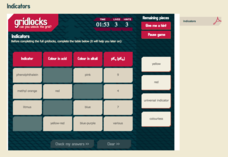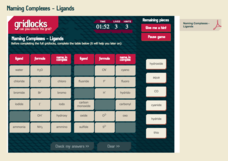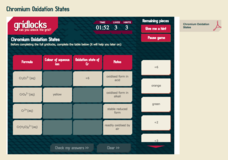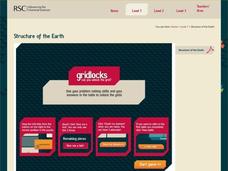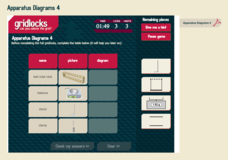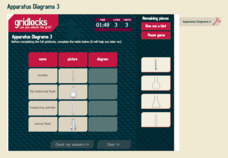Royal Society of Chemistry
Mass Concentration of Solutions
Ready to teach your class about molar mass and solution concentration? Make time for an interactive resource that will challenge their reasoning and problem-solving skills. Science scholars calculate the molarity of several solutions...
Royal Society of Chemistry
Indicators
How do chemists know what indicator solution is the perfect match for the acid or base they're studying? Discover a rainbow of indicator-related properties with an Internet resource. Individuals relate the indicator solution to its...
Royal Society of Chemistry
Gas Laws: Converting Units
Given a choice between playing a game or completing a worksheet, which do you think your class would choose? Tap into their reasoning skills with a series of puzzles focused on gas laws unit conversion. You can use the resource online or...
Royal Society of Chemistry
Electronegativity Values
Finally, an electronegativity resource your class will be strangely drawn to! Skilled scientists manipulate interactive puzzles to gain an understanding of common electronegativity values. The great thing? You can conduct the lesson...
Royal Society of Chemistry
Concentration of Solutions 1
Need a fun solution to teaching ... solutions? A series of puzzles provides reinforcement to key molarity terms and calculations. Science scholars determine the concentration of several solutions before using the information to solve...
Royal Society of Chemistry
Complex Ion Shapes
Things are really shaping up! Provide young chemists with polyatomic ion practice using an interesting interactive. Individuals complete puzzles focused on molecular geometry and complex ions.
Royal Society of Chemistry
Shapes of Molecules—Geometry of Central Atom
How is a molecule's shape determined? Explore bond angles, lone pairs, and VSEPR theory through a logic-based activity. Chemists pull together information about the major molecular shapes, then use it to solve puzzles.
Royal Society of Chemistry
Organic Names—Functional Groups
Worried that your lesson plan about functional groups is dysfunctional? Liven things up with interactive puzzles! Curious chemists arrange functional groups based on name, formula, suffix, and an example. The challenge begins when the...
Royal Society of Chemistry
Naming Esters
Do your chemistry scholars know their esters? Introduce the class to the nomenclature and structural formulas of common esters through thought-provoking games. Individuals or pairs of pupils match the name with the formula before using...
Royal Society of Chemistry
Naming Complexes—Ligands
Naming complexes can be, well, pretty complex! Simplify a study of ligands using interactive puzzles. Junior chemists match up the name, formula, and complex name, then solve a series of logic games with the information.
Royal Society of Chemistry
Moles Equations (16-19)
How many calculations can you think of that include moles? Chances are, plenty! Show young chemists the uses of the multifaceted mole with thought-provoking puzzles. Individuals identify and associate the outcomes of molar quantities...
Royal Society of Chemistry
Isomers of (E)-but-2-ene
One chemical formula—but how many different structures? Familiarize young chemists with the concept of isomers through simple, related games. Users identify each isomer base upon its name, structure, and type of isomerization in a set of...
Royal Society of Chemistry
Halide Ion Tests
Young chemists love it when colorful solid products appear in a reaction vessel! Scholars discover the products that form during halide ion tests through a hands-on activity. Users go online and apply chemistry knowledge and reasoning...
Royal Society of Chemistry
Functional Groups
Looking for a highly functional tool to teach young chemists functional groups? Engage the class with a series of logic-based games. Users identify 12 different functional groups by name and formula to work their way through challenging...
Royal Society of Chemistry
Concentration of Solutions 2
Challenging and interactive—everything you need in a resource! Chemistry scholars manipulate a series of puzzles focused on molarity. The teacher's guide provides support for implementing the lesson, as well as printable materials.
Royal Society of Chemistry
Chromium Oxidation States
Colorful chromium is captivating! Science sleuths solve a series of puzzles using an interactive resource. Individuals relate the oxidation states of chromium to the colors produced when the compound is placed in acidic or basic solutions.
Royal Society of Chemistry
Testing for Gases
If most gases are invisible, how do we know so much about them? Pupils practice associating the name, formula, testing method, and outcome for four common gases using an interactive. Users build on the content of their first puzzles to...
Royal Society of Chemistry
Structure of the Earth
What lies beyond the ground beneath our feet? Young geologists learn the four main layers of Earth with an engaging puzzle set. The interactive illustrates each layer, and users must place them correctly before they can progress to the...
Royal Society of Chemistry
Elements 1
The periodic table can be a little overwhelming to young scientists. Meet your class' worries head on by introducing the table in a game. Individuals test their knowledge of the names and symbols of common elements, then use deductive...
Royal Society of Chemistry
Compounds Ending in 'ate'
Tackle polyatomic ions with Sudoku-like games! Nomenclature novices practice identifying the names and constituents of carbonate compounds with a series of puzzles. Scholars can use the resource online or as a worksheet, thanks to the...
Royal Society of Chemistry
Extraction of Copper
Is copper found as a raw material? Science sleuths manipulate the reactants and products found in the copper extraction process in a series of fun puzzles. The interactive engages learners in pairing formulas with their names while using...
Royal Society of Chemistry
Common Compounds
Can your young chemists identify the most commonly used chemicals in the lab? Introduce the class to the go-to substances in most middle and high school chemistry experiments with an interactive. The resource offers timely feedback as...
Royal Society of Chemistry
Apparatus Diagrams 4
Lab tools are cool! But, which one is the right tool for the job? Young scientists participate in a series of puzzles focused around some common lab equipment. Each puzzle requires learners to associate the tool with its image and a...
Royal Society of Chemistry
Apparatus Diagrams 3
Glassware everywhere! How do you help scholars learn to identify the different types of laboratory glassware? Introduce them to some of the main tools of the trade through interactive puzzles. Users match and manipulate items based on...



